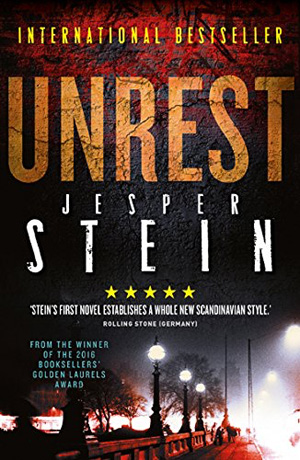
A man has been found beaten and strangled to death at the base of a tree in the Assistens Cemetery. He is dressed like an autonomist – hooded with balaclava and boots – and is handcuffed as though he’d been arrested. The murder looks bad for the police and after an inevitable leak, the police/press dance begins as Steen’s bosses prepare statements while admonishing him to solve the case ASAP or face dismissal. Amazingly, the two cops on duty in the cemetery 50 yards from the crime scene saw nothing at all, so how did this happen right under their noses? When Steen questions them, he knows they’re hiding something, but are they murderers, or is this part of an elaborate set-up?
Then there’s the wannabe activist, Piver. He’s got hold of video footage of the murder but soon finds he’s in over his head. The police are the least of his worries, though. A mysterious killer is even more keen to find him. But the killer is not the only one interested in the recording. Former radical activist Martin Lindberg, now editor of Counterpress, has bad blood with Steen going back to the 90s and is looking to expose the police for the murder and a cover-up.
Before Steen can get his bearings, officers from the PET, Denmark’s national security agency, swoop in with an inordinate interest in the corpse, who turns out to be a Macedonian drug smuggler named Enver Davidi, deported years earlier. With their secretive, need-to-know attitude it’s hard to get straight answers from PET, but something stinks in Denmark. When it turns out that 15 kilos of cocaine also disappeared when Davidi was killed, the Albanian mafia and a local Copenhagen kingpin named Moussa become another line of enquiry. Steen is forced to collaborate with PET, which happens to be headed by his wife’s new squeeze Jens Jensen. As he tries to overcome his acute jealousy, Steen begins to suspect PET is hiding its connection to Davidi, who is starting to look like an informer sacrificed in a botched drug deal. More than that, Davidi’s widow turns out to be a former lover of Steen’s, and she may hold the key to solving the case.
New in translation, Scandinavian crime fiction wonder boy Jesper Stein weaves several complicated sub-plots to support his detective’s dogged mission to find the truth. His breezy prose belies a complex unrolling of clues that draws you in while withholding the whodunit until the last pages, all without a slack in narrative tension or enjoyment of the story. Stein’s real strengths are his expositional asides where he gives insight into characters’ backstories as well as a remarkably keen insight into criminal procedure, the tense interplay of press and the police, the judicial system and the political realities of police administration. All these elements are incorporated without missing a beat between dramatic scenes of conflict involving Steen, the police, drug dealers, mercenary journalists, anally-retentive bosses, and various torrid love interests.
Unrest is an auspicious debut in English of what promises to be a very entertaining Scandinavian series. Stein is a quick study of the archetypical Nordic noir protagonist – an angsty maverick cop with death on his shoulder who ponders a bleak landscape. He has an innate sense of justice, an antagonistic boss and operates in the socially critical milieu that comes with the package. Issues here include human trafficking, militarisation of the police, xenophobia and the obligatory cracks in the social welfare system.
It’s no wonder that Unrest has been snatched up for television. Stein delivers a wholly enjoyable thriller, but don’t expect anything radically new brought to the genre. Some aspects feel underdeveloped and even a bit stock, like Steen’s cute five-year-old daughter who gets lost in the cemetery, and wanders among corpses in the morgue – scenes that will play better in screenplay form. Otherwise, the characters are very well-rendered, you feel the tension between them and hope Steen closes the case before his health fails. As he closes in on the truth, he realises in the tender and sad final scenes that more often than not crime is rooted in the most primitive of human emotions.
For more Danish crime fiction, try the Department Q series by Jussi Adler-Olsen.
Mirror Books
Print/Kindle/iBook
£3.99
CFL Rating: 4 Stars